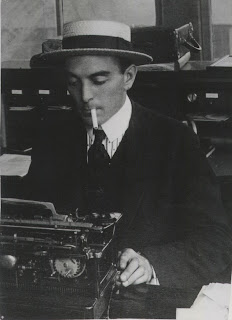
In introducing my Ring Lardner imitation the other day, though I apologized to Lardner's fans, I forgot to apologize to his ghost. But if F. Scott Fitzgerald is right about Lardner, with whom he was close friends for many years, I shouldn't be worried:
It is hard to understand but I don't think he really gave a damn about anything except his personal relations with a few people. A case in point was his attitude to those imitators who lifted everything except the shirt off his back--only Hemingway has been more thoroughly frisked--it worried the imitators more than it worried Ring. His attitude was that if they got stuck in the process he'd help them over any tough place.
I took those lines from Fitzgerald's obituary remembrance of Lardner, who died in 1933 at the age of forty-eight, which is included in The Crack-Up (1945), the Edmund Wilson-edited book of Fitzgerald odds and ends. The whole obituary is worth reading. Fitzgerald appraises his friend with a clear-eyed honesty that would seem cruel were it not rooted in a deep appreciation of Lardner's underlying talent:
So one is haunted not only by a sense of personal loss but by a conviction that Ring got less percentage of himself down on paper than any other American of the first flight.Fitzgerald attributes Lardner's failure to his early years covering baseball:
A writer can spin on about his adventures after thirty, after forty, after fifty, but the criteria by which these adventures are weighed and valued are irrevocably settled at the age of twenty-five. However deeply Ring might cut into it, his cake had exactly the diameter of Frank Chance's diamond. . . . It was never that he was completely sold on athletic virtuosity as the be-all and end-all of problems; the trouble was that he could find nothing finer.That attribution seems to reflect Fitzgerald's own preoccupation with youth--he already saw his best years fading behind him though he was only thirty-seven--at least as much as they reflect the reality of the difficulties facing Lardner. In fact, the whole obituary, with its lament of lost promise, of a genius fallen silent at a young age, is impossible to read without thinking that Fitzgerald is writing about himself, too, and maybe even realizes it.
He kept on recording but he no longer projected, and this accumulation, which he has taken with him to the grave, crippled his spirit in the latter years. . . . He had agreed with himself to speak only with a small portion of his mind.Another writer whom that description brings to mind is J. D. Salinger--who names Lardner as one of Holden Caulfield's favorite writers in A Catcher in the Rye.
Despite the wasted talent, despite the sadness and frustration that Fitzgerald identifies, the impression one is left with after his words is of a man who was, as the lines I used for this post's headline indicate, kind and attentive, loyal to his friends if not to his talent:
The woes of many people haunted him--for example, the doctor's death sentence pronounced upon Tad, the cartoonist (who, in fact, nearly outlived Ring)--it was as if he believed he could and ought to do something about such things. . . . So he was inclined to turn his cosmic sense of responsibility into the channel of solving other people's problems--finding someone an introduction to a theatrical manager, placing a friend in a job, maneuvering a man into a golf club. The effort made was often out of proportion to the situation.As for Lardner's wit, which survived his loss of faith in his writing, Fitzgerald demonstrates it nicely by reproducing a refreshingly odd telegram Lardner to sent him and Zelda:
WHEN ARE YOU COMING BACK AND WHY PLEASE ANSWERUltimately, though, Fitzgerald concludes in sadness--not so much because of the art Lardner might have written and didn't, but because he felt inadequate in his friendship:
At no time did I feel that I had known him enough, or that anyone knew him--it was not the feeling that there was more stuff in him and that it should come out, it was rather a qualitative difference, it was rather as though, due to some inadequacy in one's self, one had not penetrated to something unsolved, new and unsaid. That is why one wishes that Ring had written down a larger proportion of what was in his mind and heart. It would have saved him longer for us, and that in itself would be something. But I would like to know what it was, and now I will go on wishing--what did Ring want, how did he want things to be, how did he think things were?From our perspective, nearly seventy-five years later, we can acknowledge Fitzgerald's personal lament while being a bit more forgiving about the work itself. People are still reading and enjoying You Know Me Al--as they're still reading The Great Gatsby--and that seems like an achievement to be proud of, regardless of what might have been.
{P.S. I was put in the mind to go back to Fitzgerald today by a nice post at Light Reading about the joys of flawed books. It's well worth checking out.}
No comments:
Post a Comment